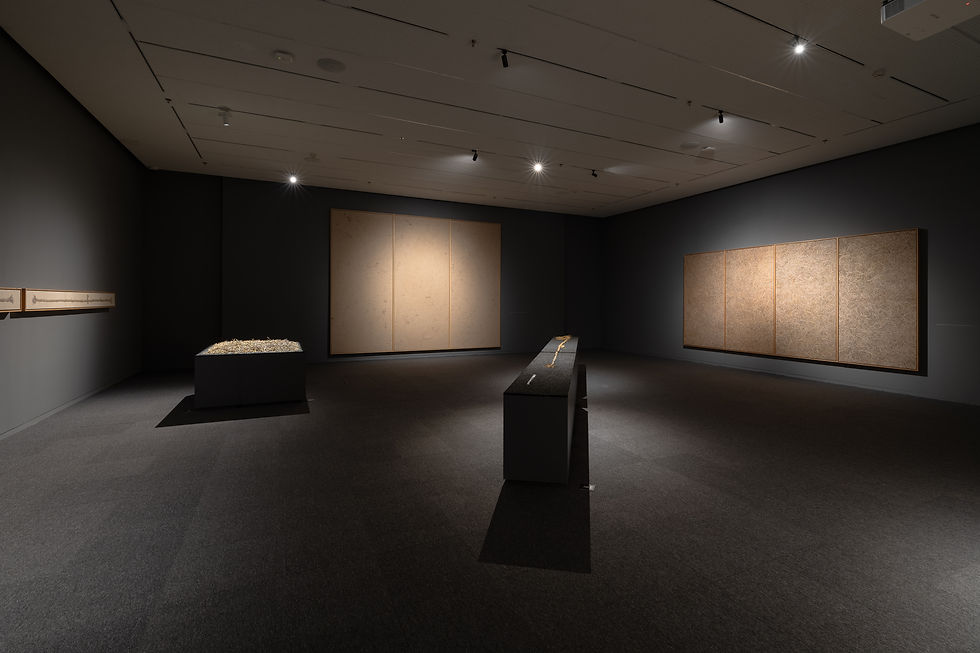I painted rice paddies all over my dad’s coffin. That’s what paradise looks like to me—and it was the last thing I could give him.
Shen Shaomin
Shen Shaomin’s groundbreaking exhibition—his first centered on rice—offers a profound exploration of the connections between rice, art, history, and the Chinese spirit. In this exhibition, rice becomes a central thread, woven through imagery, material, concept, and cultural memory. Set in Jiayuanhai Art Museum—uniquely located within a rice paddy—the exhibition becomes both site-specific and deeply personal, offering Shen a rare context for experimentation and reflection. What role did rice play in his upbringing? What imprint has it left on Chinese history and collective memory? How can rice, as both medium and metaphor, open up new dialogues in contemporary art? And how might those dialogues extend across sociology, economics, and history? These questions surfaced throughout Shen’s creative process, ultimately taking form in a series of works spanning diverse materials and media. The exhibition features painting, installation, performance, and video—each expressing Shen’s layered engagement with rice. Some straw is pulped into paper, some burned into ash: the finest ash becomes rice ink; the coarser, pressed into ink bricks. These transformations are not just technical—they reveal a deep emotional resonance between people, land, and sustenance, inviting viewers to rediscover the quiet warmth and cultural weight held in something as everyday as rice.
10 tons of straw from the museum’s fields, burned to ash—fuel for Shen Shaomin’s new series on rice.
Shen Shaomin
Rice: Verses for the Hungry Soul
Nov 3, 2024 - Mar 2, 2025
“Rice (米, mǐ)” is a fascinating Chinese character layered with multiple connotations in its perfect visual structure. It is both pictographic and ideographic: ancient people compared the “十” (shí, literally “ten”) component in the character to the rice stalks in the fields, which yield tiny grains of rice that “sprawl freely in every direction”. This structure further invites conceptual associations — here “禾” (hé, ”rice plant”) and “粒” (lì, ”grain”) morph into holistic directions and facets in an abstract sense, which further constitute an all-encompassing framework of orientation, a metaphor implying the infinity of spatial-temporal expansion. As an ancient text states, “the eight directions stretch vast and wide, while the nine regions lie in desolate expanse.” The entire world is therefore encapsulated within “rice”.
The world cannot be without people, and people cannot be without food. Thus, “rice” also symbolizes the foundation of human life. Our ancestors cultivated it — archaeologists have traced the cultivation of rice back 10,000 years to the Yangtze and Pearl Rivers. One cannot help but wonder, over the following generations, how many people have toiled for it, and how many people have suffered the agony of hunger due to a lack of rice in their pots. As long as humanity exists, rice will not disappear; it will continue to connect us to nature in an increasingly virtual world.
The alignment of the images, substances, concepts, and history in “rice” reverberates throughout this exhibition. The Jiayuanhai Art Museum, located in the middle of a rice paddy, provides Shen Shaomin with an ideal site for developing an ambitious experimental art project, prompting him to embark on a retrospective journey regarding “rice.” What role has rice played in his growth? What marks has it left in Chinese history and the memories of the Chinese people? How to induce the interaction between “rice” and contemporary art? How does this interaction provoke the involvement of sociology, economics, and history? One after another, these questions arise in his mind, before being crystallized in groups of artworks of varying materials, mediums, and configurations, guiding visitors to engage in his recollections and reflections.
Wu Hung, Curator


Curator: Wu Hung
Art historian, critic, and curator. Director of the Center for the Art of East Asia at the University of Chicago. Wu Hung is an elected member of the American Academy of Arts and Sciences and the American Philosophical Society, and sits on the boards and advisory committees of many research institutes and museums in the United States and China. His work spans both ancient and contemporary art.

Artist: Shen Shaomin
As an artist born in the 1950s in Acheng, Northeast China, and having lived through the Great Famine in the early years of the People’s Republic, Shen Shaomin holds a deep, unspoken connection to food, rice, and the land. Decades later, this sincere and grounded emotional bond merges with his long-standing explorations in contemporary art—particularly in public art and the relationship between art and technology.

Rice: Verses for The Hungry Soul
Shen Shaomin
I Am Always the Result of Myself, 2023
rice ash brick
205 x 300 x 50 cm

Sheep Troubled by Food, 2024
ten tons of rice straw, ten goats
variable size

Rice Totem Pole, 2024
rice, seed, ash, PVC, aluminum
300 x 50 x 50 cm

Incinerator
Used to burn 1 ton of rice straw into ash, then turn it into rice bricks and rice inks.

Rice Laboratory
Where DNA extraction experiment were performed

Rice Ink, 2024
rice straw ink, wooden mold
50 x 20 x 20 cm

Manuscript on Rice Research, 2024
ink on rice paper
760 x 50 cm x 8
Rice Specimen
Through daily collection, each stage of rice growth is carefully recorded. Some plants are cleaned and pressed into dried specimens, capturing their strength and grace. Others are preserved in liquid to retain their shape and color, revealing another vivid side of rice.

Wet Rice Specimen (growth stage)

Wet Rice Specimen (mature stage)
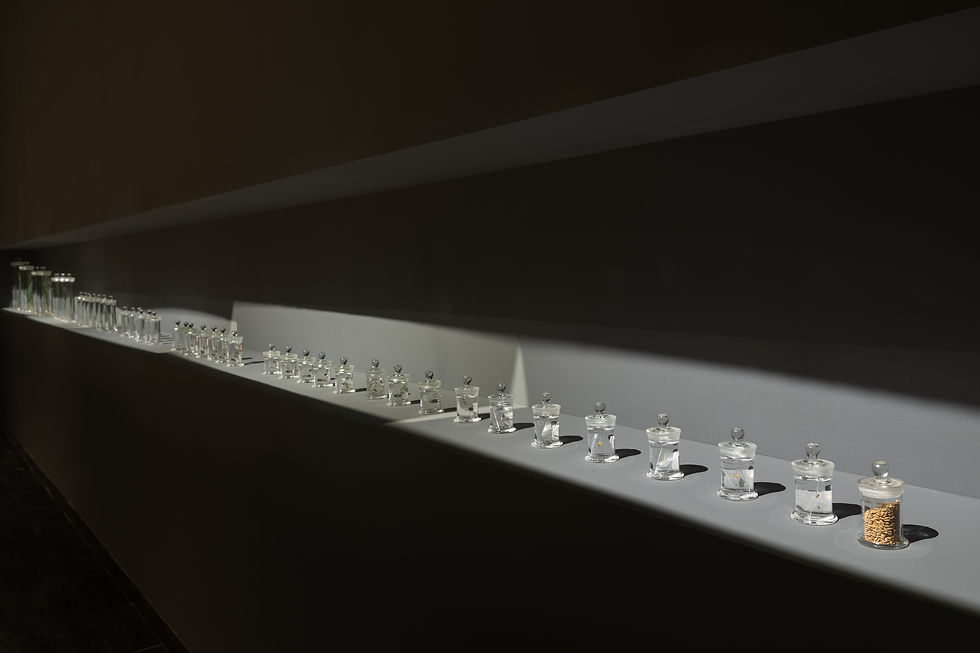
Wet Rice Specimen (seed stage)

Dry Rice Specimen
Still a lot of staw made eternal, 2024
ceramic
120 x 120 x 82 cm

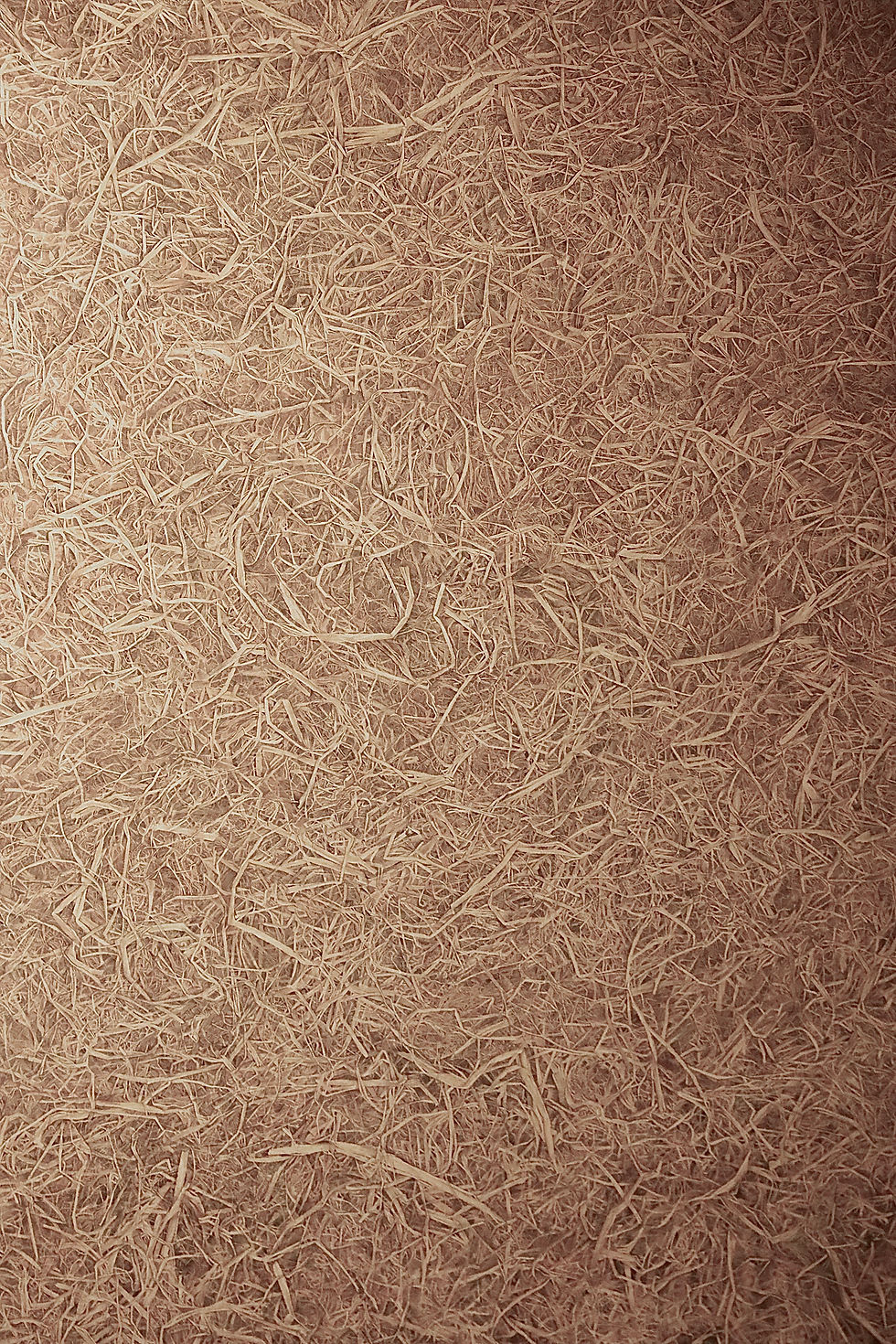




Still a lot of staw ...
Human memory and thought are easily altered, forgotten, or even manipulated—but the memory of the stomach endures. The tastes and sensations it holds are etched into us, never fading.
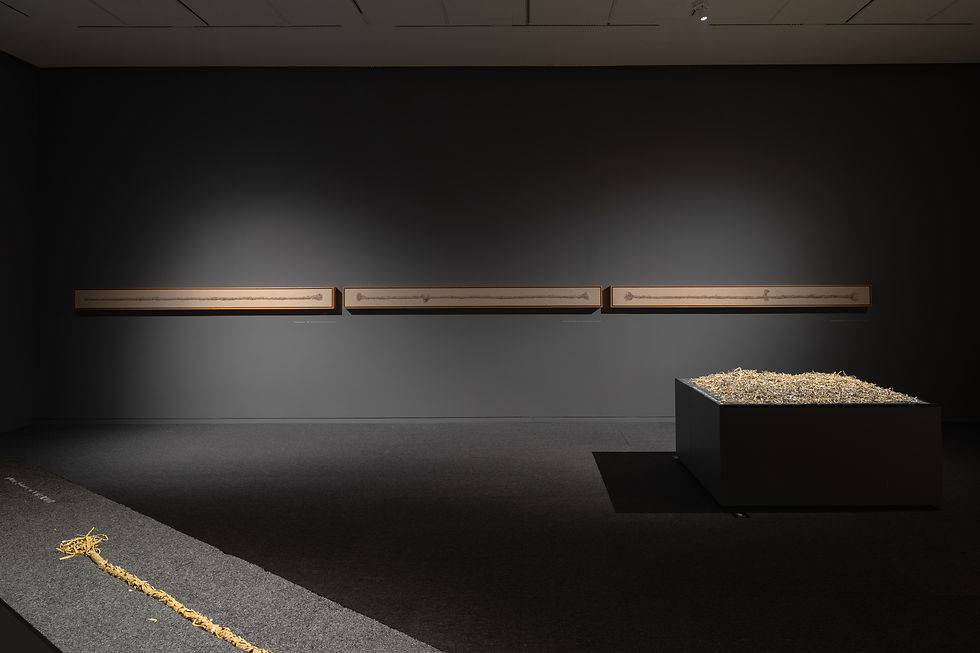.jpg)
.jpg)
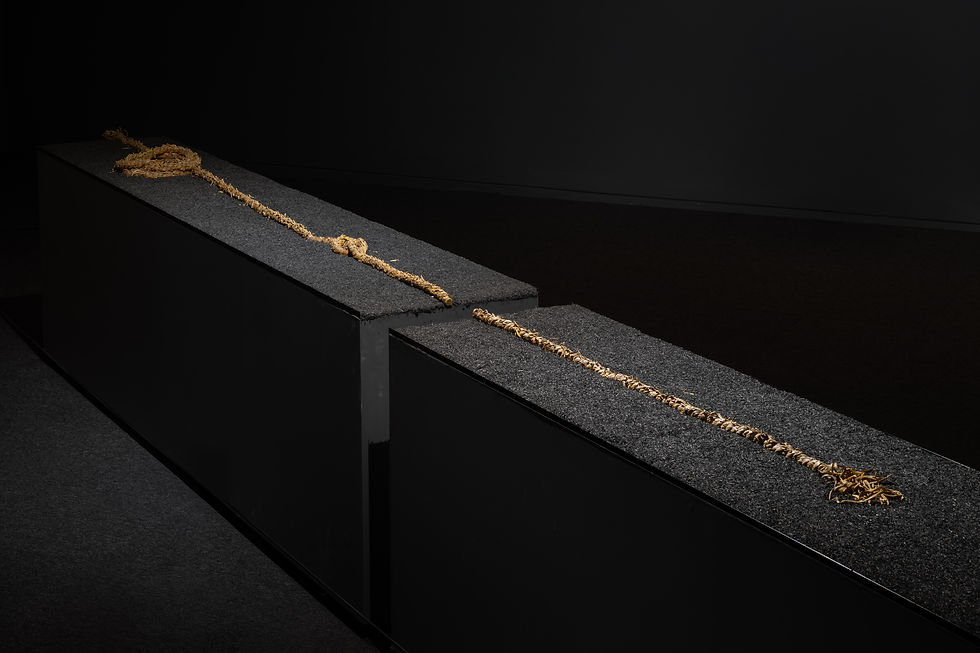




Rice Research
The work brings together a large number of precious food coupons, grain certificates, and a series of newspapers closely related to the rice industry, jointly constructing a vivid history of food and revealing the magnificent changes experienced in the field of food distribution and consumption in China.

Literature on Rice research
Newspaper clipping from the 1960s reporting a significant increase in rice production during the early years of the People’s Republic of China. Such headlines were common during the Great Leap Forward and its aftermath, reflecting the state’s emphasis on agricultural self-sufficiency, ideological mobilization, and the symbolic role of rice in national narratives of progress.


Liangpiao (粮票, grain ration coupons used in planned economy-era China)
Manuscript on Rice Research, 2024
760 x 50 cm x 8
Hand-drawn illustration depicting the growth cycle of a rice seed—from germination and transplanting to maturation and harvest. The drawing emphasizes the intimate, time-bound relationship between humans and the rice plant, highlighting traditional agricultural knowledge and the embodied rhythms of rural labor.

Manuscript on Rice Research, 2024
760 x 50 cm x 8
The illustration reflects an embodied agricultural knowledge system in which labor, time, and ecology are deeply interwoven in the cultivation of rice.
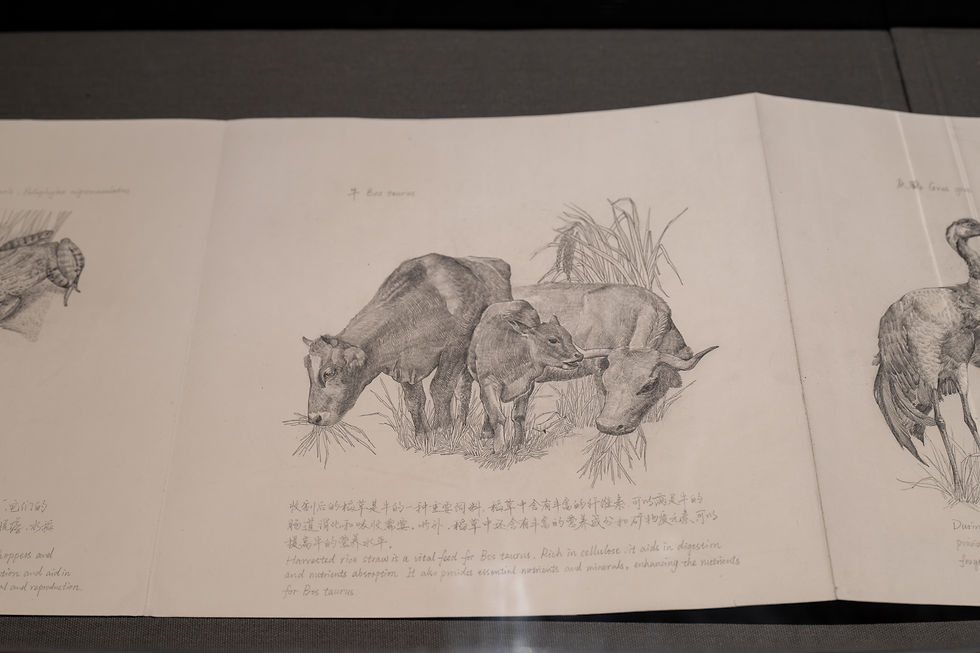
View More
Exhibition Photos


